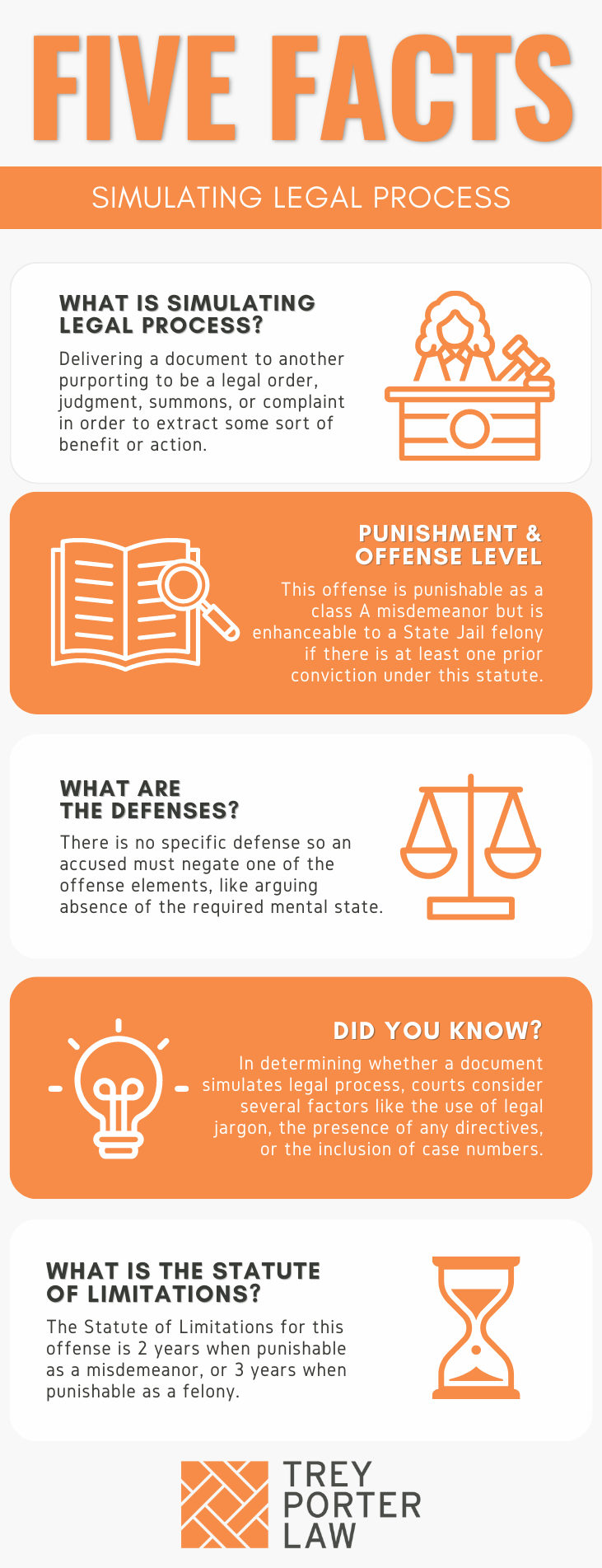WHAT IS SIMULATING LEGAL PROCESS IN TEXAS?
The Texas law against simulating legal process prohibits sending a document to another purporting to be a summons, complaint, judgment, or other court process in an effort to extract payment, exercise authority, or cause the recipient to take or refrain from any action in compliance with the document’s demands.
- What is an example of “legal process”? The Texas Penal Code does not define legal process. The Texas Court of Criminal Appeals has held “legal process” includes any legal documents emanating from a court. Relevant factors to determine whether a document simulates legal process include:
-
- the use of terms commonly used in litigation and citation to legal authority;
- the method of delivery;
- the presence of a demand or directive;
- the nature of any demand or directive;
- the document’s internal characterization of its import; and
- the presence and extent of formalities generally associated with process, such as declarations, cause numbers, seals or captions. Runningwolf v. State, 360 S.W.3d 490 (Tex. Crim. App. 2012).
WHAT IS THE SIMULATING LEGAL PROCESS LAW IN TEXAS?
Tex. Penal Code § 32.48. SIMULATING LEGAL PROCESS.
(a) A person commits an offense if the person recklessly causes to be delivered to another any document that simulates a summons, complaint, judgment, or other court process with the intent to:
(1) induce payment of a claim from another person; or
(2) cause another to:
(A) submit to the putative authority of the document; or
(B) take any action or refrain from taking any action in response to the document, in compliance with the document, or on the basis of the document.
(b) Proof that the document was mailed to any person with the intent that it be forwarded to the intended recipient is a sufficient showing that the document was delivered.
(c) It is not a defense to prosecution under this section that the simulating document:
(1) states that it is not legal process; or
(2) purports to have been issued or authorized by a person or entity who did not have lawful authority to issue or authorize the document.
(d) If it is shown on the trial of an offense under this section that the simulating document was filed with, presented to, or delivered to a clerk of a court or an employee of a clerk of a court created or established under the constitution or laws of this state, there is a rebuttable presumption that the document was delivered with the intent described by Subsection (a).
(e) Except as provided by Subsection (f), an offense under this section is a Class A misdemeanor.
(f) If it is shown on the trial of an offense under this section that the defendant has previously been convicted of a violation of this section, the offense is a state jail felony.
WHAT IS THE PENALTY CLASS FOR SIMULATING LEGAL PROCESS IN TEXAS?
The first offense of simulating legal process is a Class A misdemeanor, punishable by up to one year in county jail. If a person has at least one previous conviction for simulating legal process, and is subsequently charged with the same offense, it becomes a state jail felony, punishable by 180 days to two years in a state jail facility.
WHAT IS THE PUNISHMENT RANGE FOR SIMULATING LEGAL PROCESS IN TEXAS?
The punishment range for simulating legal process charged as a Class A misdemeanor is up to one year in jail, and a maximum $4,000 fine. If a person is charged with simulating legal process enhanced to a state jail felony, the punishment range is 180 days to two years in a state jail facility, and a maximum $10,000 fine.
WHAT ARE THE PENALTIES FOR SIMULATING LEGAL PROCESS IN TEXAS?
A person charged with simulating legal process may be eligible for probation after a conviction, or deferred adjudication without a conviction. The period of community supervision for a Class A misdemeanor may not exceed two years. The period of community supervision for a state jail felony ranges from two to five years, with the possibility of extending supervision for up to ten years.
WHAT ARE THE DEFENSES TO SIMULATING LEGAL PROCESS IN TEXAS?
The statute does not authorize specific defenses to simulating legal process. A person accused thereof may attempt to negate at least one of the elements the State must prove at trial.
WHAT IS THE STATUTE OF LIMITATIONS FOR SIMULATING LEGAL PROCESS IN TEXAS?
The limitation period for simulating legal process categorized as a Class A misdemeanor is two years. If it is a state jail felony, the limitation period is three years.
(8) SIMULATING LEGAL PROCESS IN TEXAS
Simulating legal process punishes a person who recklessly delivers or causes to be delivered to another a document held out to be a summons, judgment, complaint, or other court process to induce payment, action, inaction, or other submission to the document’s purported authority.
TEXAS SIMULATING LEGAL PROCESS COURT CASES
The case law regarding simulating legal process in Texas illustrates the fact-specific inquiry to determine whether something is a “legal process.”
- In Runningwolf v. State, a church leader sent the victim a ten-page document entitled “Non-Statutory Abatement,” of an “Ecclesiastic Court,” purportedly signed by an officiating judge. The victim had just been awarded custody of a child against a church member, and the document cited case law, used legal terminology, and demanded submitting the child custody matter to the authority of the ecclesiastic court.The church leader was convicted of simulating legal process, and the appellate court affirmed. The victim called police immediately, and asked whether the document was valid. The document was intended to cause the victim to submit to its putative authority.

















